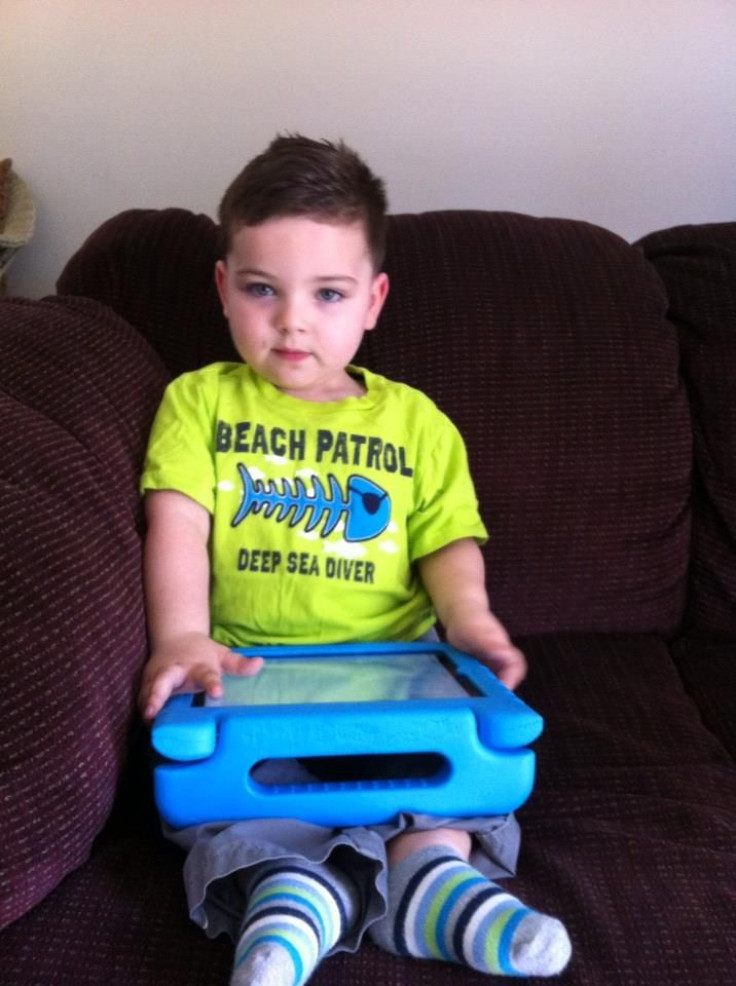Toddlers Addicted To Tablets, As Experts Warn Of Long-Term Implications

The handheld computer for toddlers has come a long way from the Etch A Sketch, a mechanical drawing tool introduced in 1960.
In northern Vermont, a particularly perspicacious 3-year-old — a boy with Duchenne muscular dystrophy — uses his plastic-encased iPad to Skype with his sexagenarian grandmother, whose own children wore corduroys and played with sticks and discarded pieces of wood.
Unable to walk, Joe Bourgeois cruises through cyberspace at something like half the speed of light, participating in what author William Gibson refers to as a "consensual hallucination experienced daily by billions" — the Internet.
Now the prevalence of tablets among toddlers has doctors worried about technology addiction and implications for the development of normal social relationships among humans here in middle space, somewhere between outer and inner space and to the side of ones and zeroes.
"Children have access to the internet almost from birth now," Dr. Richard Graham, a technology addiction expert, told media Sunday. "They see their parents playing on their mobile devices and they want to play too. It's difficult, because having a device can also be very useful in terms of having a reward, having a pacifier. But if you don't get the balance right it can be very dangerous.
Experts on technology addiction and childhood development warn that parents who allow their babies and toddlers access to tablet for several hours per day may cause adverse effects in the long run. Graham said small children denied access to their tablets exhibited many of the signs of addiction withdrawal as alcoholics and heroin addicts, including agitation and uncontrolled behavior when denied their fix.
"They can't cope and become addicted, reacting with tantrums and uncontrollable behavior when they are taken away," Graham said. "Then as they grow older, the problem only gets worse. Even the most shy kids, when they hit their teens, suddenly want to become sociable and popular."
Graham said he recently worked with a 4-year-old patient who'd become so addicted to her iPad, using it for several hours or more per day, that she became "distressed and inconsolable" when her parents took it away. For approximately $25,000, the Capio Nightingale clinic in London offers a 28-day "digital detox" program for such children.
Psychiatrists say the number of people who experience digital addiction has risen by 30 percent during the past three years, with a survey last week showing more than half of parents allowing their babies to play with cellphones and tablets. Though fumbling with a phone, much improved over the Fisher Price version, might not sound troubling, 1 in 7 parents admitted they let their kids play with them for more than four hours per day.
James Macfarlane, managing director for the website that conducted the poll, said: "Given that babies between 3-12 months are awake for only around 10 hours per day this is a huge proportion of their waking day. Although 81 per cent of our users felt that children today spend too much time on smart devices, it hasn't put most of them off using them to entertain their baby."
Regarding the long-term effects on child development, however, the American Academy of Pediatrics told NPR today, "We simply don't have the science right now to comment."
But many parents — including Bourgeois' mother, Sara — believe the technology helps their child. "I don't know what Joe would do without his. It's been beneficial for his fine motor skills and actually does more than most of the occupational therapy he receives," said Sara, a nursing student at Community College of Vermont. "Plus, now he can recognize letters and spell his name on it too. It's only getting more useful as he grows older. I know people who think it is outrageous to have an iPad at his age, but I think it's great, especially considering the therapeutic benefits."
Aside from using numerous educational programs, the 3-year-old enjoys playing "Angry Birds."
For others, potty training remains wildly popular among toddlers:



























